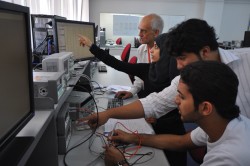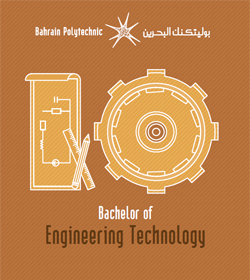Programme Length
- 8 Semesters (Full-Time) – 480 credits
Programme Entry Requirements
Applicants must achieve the minimum requirements in the English and Mathematics entry tests OR passing Maths and English courses in the Foundation programme.
Course FeesApply Now
Introduction and Programme Aims
 The aim of this programme is to provide students with a comprehensive set of theoretical knowledge and practical skills for employment as engineering technologists. Both qualifications are fit-for-purpose in terms of addressing the Industrial needs nationally, regionally and internationally. Through the application of the Problem Based learning methodology, the required theoretical, practical and employability skills are transferred to our graduates in order for them to transform into work – ready and enterprising graduates that will enhance the value of the Society and the Bahraini economy. The students are motivated to learn through the application of engineering analysis, design and the evaluation of real life problems and the inclusion of various courses in English Language, Mathematics, Project Management, Ethics and Social responsibility.
The aim of this programme is to provide students with a comprehensive set of theoretical knowledge and practical skills for employment as engineering technologists. Both qualifications are fit-for-purpose in terms of addressing the Industrial needs nationally, regionally and internationally. Through the application of the Problem Based learning methodology, the required theoretical, practical and employability skills are transferred to our graduates in order for them to transform into work – ready and enterprising graduates that will enhance the value of the Society and the Bahraini economy. The students are motivated to learn through the application of engineering analysis, design and the evaluation of real life problems and the inclusion of various courses in English Language, Mathematics, Project Management, Ethics and Social responsibility.
Majors
To view the courses of each major, please click on the links below.
- Mechanical Engineering
- Electronics Engineering
- Electrical Engineering
- Electromechanical Engineering
- Communications and Networks
Graduate Profile
On successful completion of this programme, students will have the skills and knowledge to be able to:
- Apply knowledge of mathematics, science, and engineering fundamentals, to applied engineering problems.
- Solve broadly-defined engineering problems using research and analysis techniques.
- Design solutions for broadly-defined engineering problems taking into account public health and safety, cultural, societal and environmental issues.
- Investigate engineering problems and do experiments to validate theoretical hypotheses.
- Apply modern engineering techniques and tools.
- Work efficiently and effectively within a team.
- Communicate effectively through reports, technical documents and presentations.
Career Opportunities
Mechanical major
- Industrial Systems.
- Product Design.
- Manufacturing.
- Product Development.
- Computer Aided Design.
- Performance evaluation.
- Reliability & Quality.
- Project Management.
- Process control and instrumentation.
Electronics Major
- Control Engineering.
- Telecommunications.
- Electronic System Design.
- Renewable Energy.
- Embedded Systems.
- Project Management and Quality
- Process Control and Instrumentation.
Electrical Major
- Electrical Machines
- Power systems
- Low voltage electrical systems
- Electrical systems for buildings
- Lighting systems
- Renewable resources of energy
- Process control and instrumentation
- Project management and quality
- Sustainable development
Teaching and Assessment
The programme is delivered through a mixture of classroom teaching, tutorials, guest speakers, online (web-based), laboratory work, workshops, problem-based learning, supervised brief and extended projects, field trips and workplace experience. Assessment of courses is both formative and summative, and typically includes a mix of tests, assignments, laboratory reports, project reports and examinations.
Work Placement
Starting from Year 2, students are required to complete 80 days of approved work placement. It is expected that this will normally occur in 4 week periods in each year of the programme.
Qualifications
- Bachelor of Engineering Technology (Mechanical)
- Bachelor of Engineering Technology (Electronics)
- Bachelor of Engineering Technology (Electrical)
- Bachelor of Engineering Technology (Electromechanical)
- Bachelor of Engineering Technology (Communications and Networks)
- Associate Degree in Engineering Technology (Mechanical) – Exit Qualification at the end of the 3rd Year
- Associate Degree in Engineering Technology (Electronics) – Exit Qualification at the end of the 3rd Year
- Associate Degree in Engineering Technology (Electrical) – Exit Qualification at the end of the 3rd Year
- Associate Degree in Engineering Technology (Electromechanical) – Exit Qualification at the end of the 3rd Year
- Associate Degree in Engineering Technology (Communications and Networks) – Exit Qualification at the end of the 3rd Year
Summary of Programme Structure
Each Major is delivered over a 4-year period. In the first year all engineering students study the basic principles of Mechanical, Electrical, and Electronics Engineering as well as Mathematics and English courses with an engineering focus. In the second year, students select their specific major and follow the relating courses according to the stream. They also select other Elective courses required in all Polytechnic degrees while the English courses tailored for engineering, continue through to the end of the second year. The students continue their studies at the third and fourth year gaining applied knowledge and problem solving skills based mostly on projects development. Each semester, students gain work experience through industry placements organized by the Polytechnic. Project based learning is common in both the Engineering degrees. Students learn through small integrated projects in the early years while the final year consists mostly of large industry linked projects.
Specific courses being delivered in this programme can be found at the Polytechnic’s website under “Bachelor of Engineering Technology”.




